Unit 2 Let‘s celebrate!单元精讲精练课件-外研版必修第二册
文档属性
| 名称 | Unit 2 Let‘s celebrate!单元精讲精练课件-外研版必修第二册 |
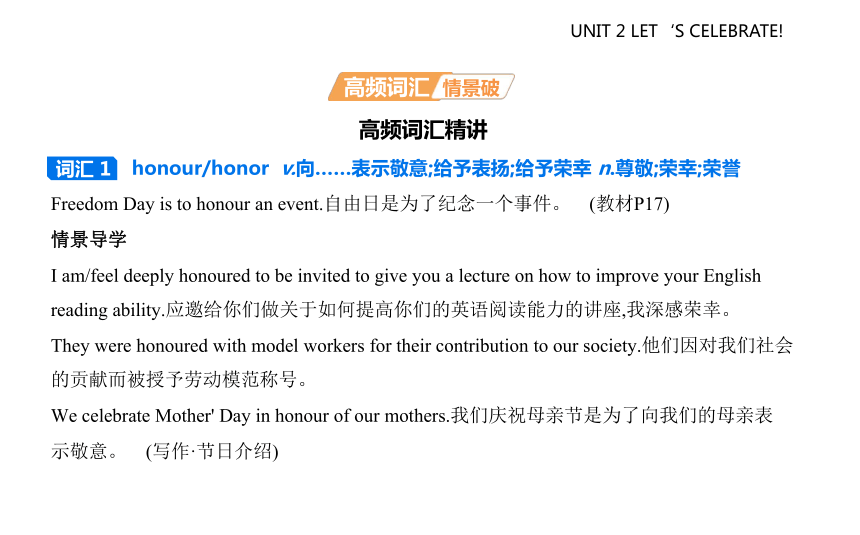
|
|
| 格式 | pptx | ||
| 文件大小 | 373.2KB | ||
| 资源类型 | 试卷 | ||
| 版本资源 | 外研版(2019) | ||
| 科目 | 英语 | ||
| 更新时间 | 2025-12-04 17:23:10 | ||
图片预览

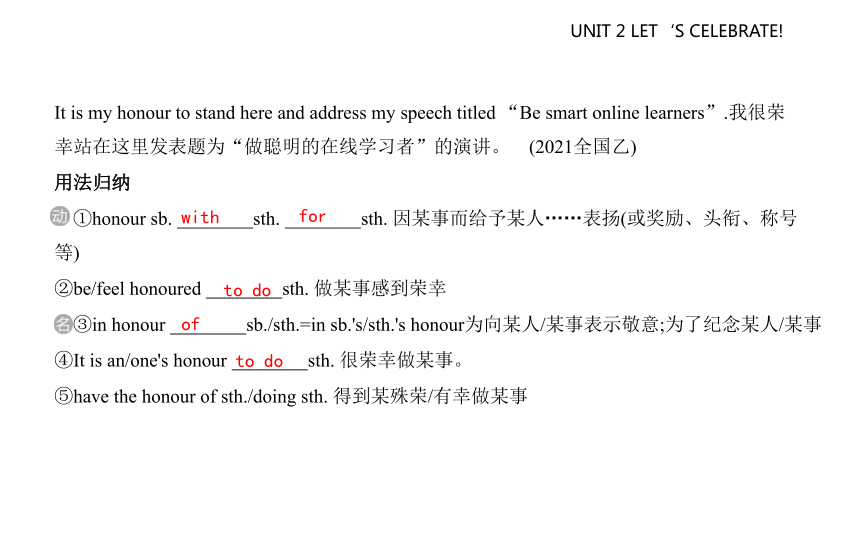

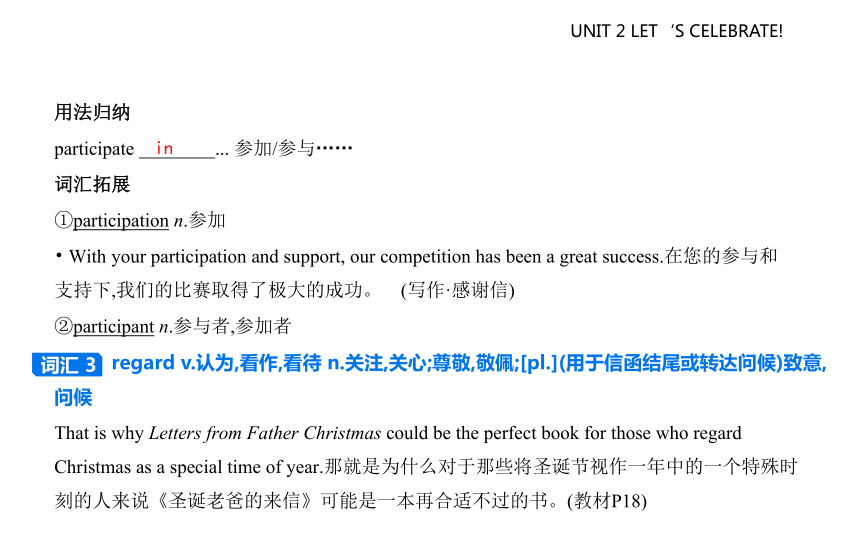
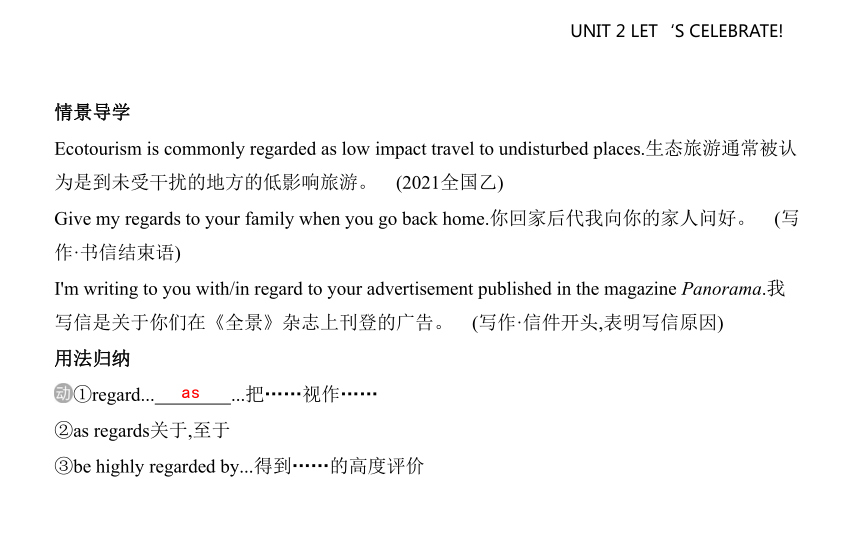
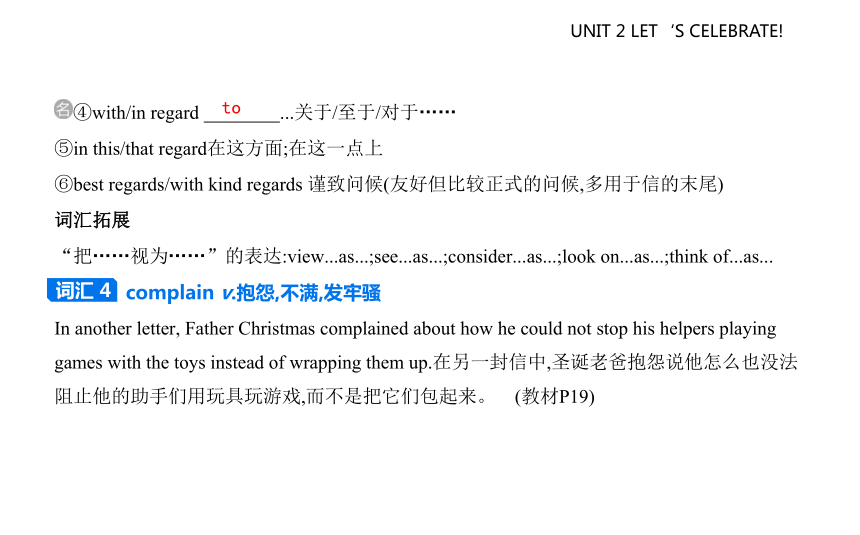
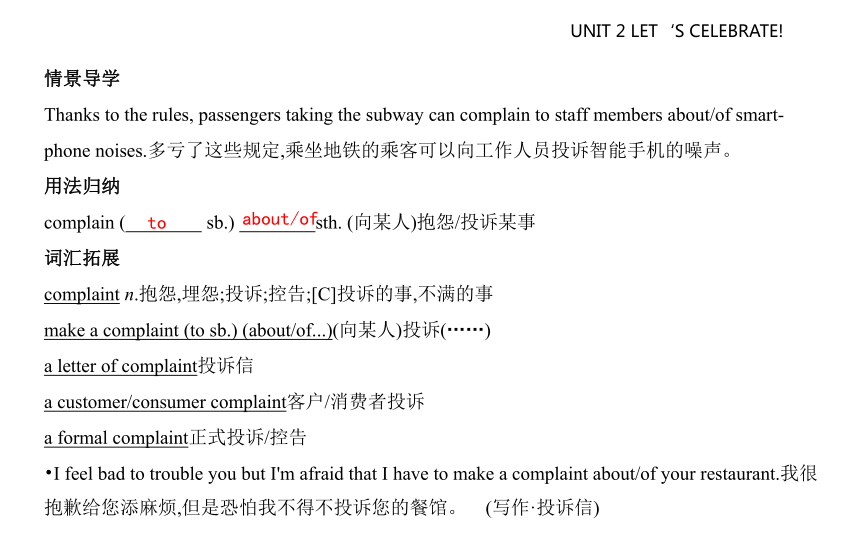
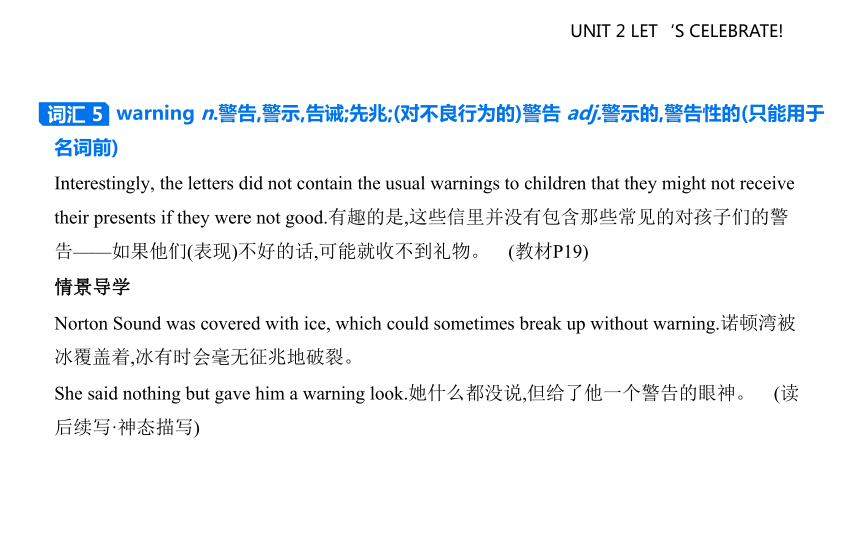
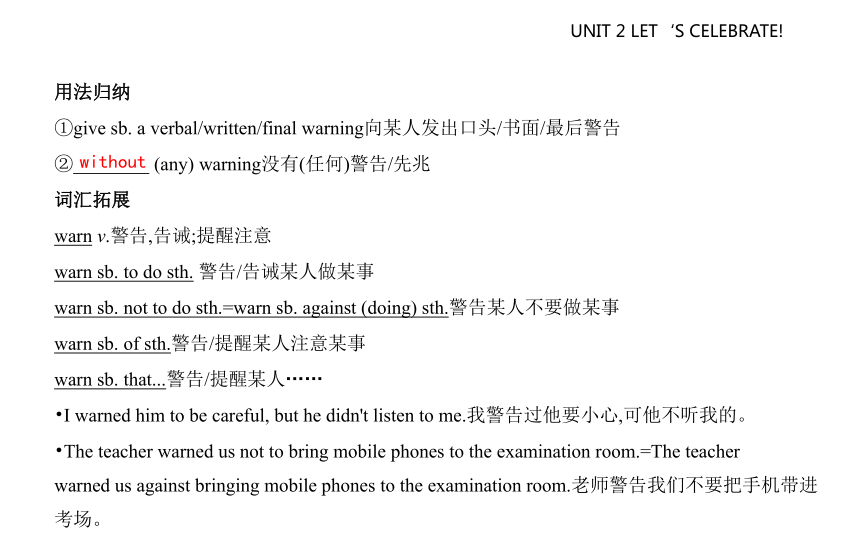
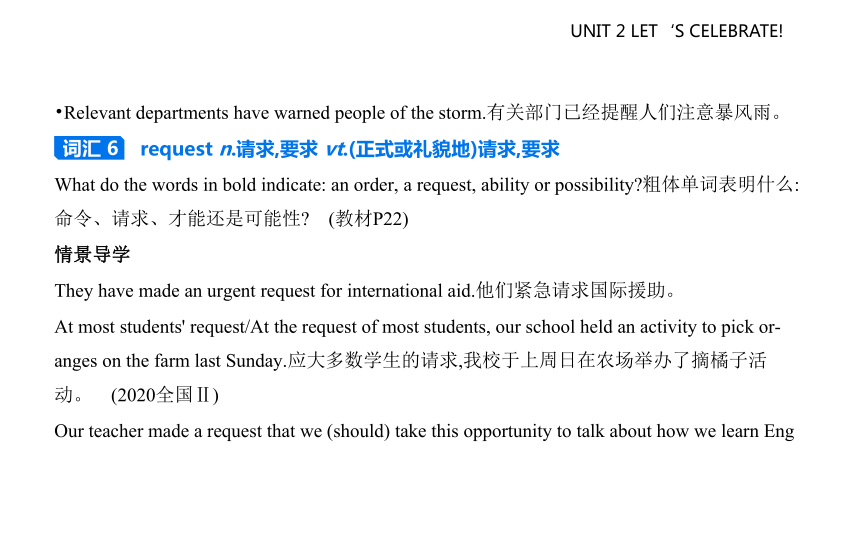
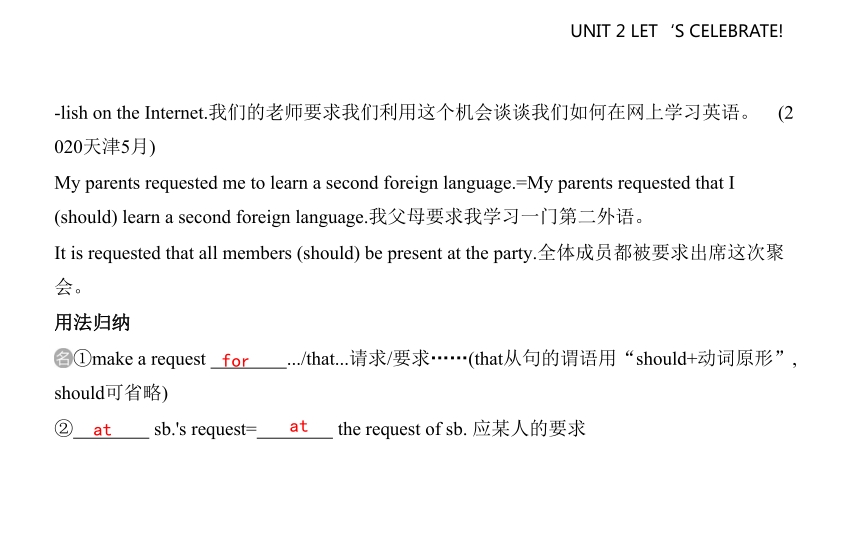
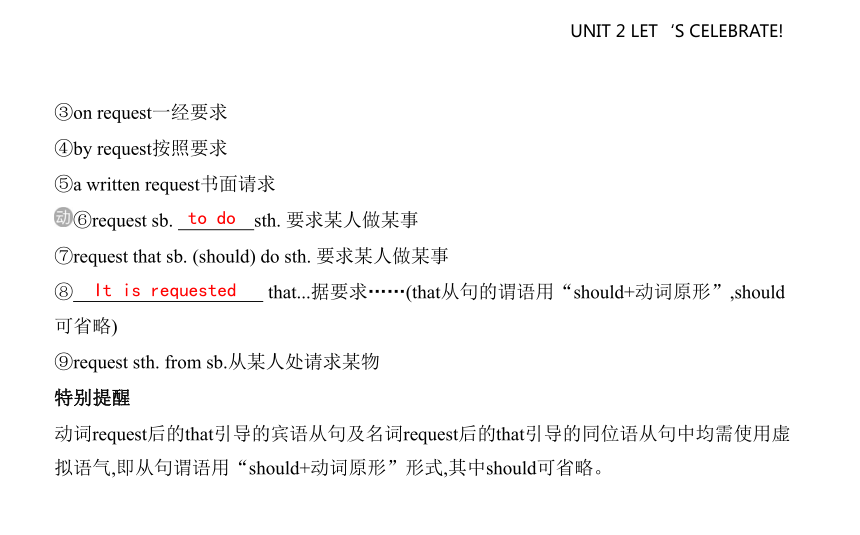
文档简介
(共48张PPT)
honour/honor v.向……表示敬意;给予表扬;给予荣幸 n.尊敬;荣幸;荣誉
Freedom Day is to honour an event.自由日是为了纪念一个事件。 (教材P17)
情景导学
I am/feel deeply honoured to be invited to give you a lecture on how to improve your English
reading ability.应邀给你们做关于如何提高你们的英语阅读能力的讲座,我深感荣幸。
They were honoured with model workers for their contribution to our society.他们因对我们社会
的贡献而被授予劳动模范称号。
We celebrate Mother' Day in honour of our mothers.我们庆祝母亲节是为了向我们的母亲表
示敬意。 (写作·节日介绍)
高频词汇 情景破
高频词汇精讲
词汇 1
It is my honour to stand here and address my speech titled “Be smart online learners”.我很荣
幸站在这里发表题为“做聪明的在线学习者”的演讲。 (2021全国乙)
用法归纳
①honour sb. sth. sth. 因某事而给予某人……表扬(或奖励、头衔、称号
等)
②be/feel honoured sth. 做某事感到荣幸
③in honour sb./sth.=in sb.'s/sth.'s honour为向某人/某事表示敬意;为了纪念某人/某事
④It is an/one's honour sth. 很荣幸做某事。
⑤have the honour of sth./doing sth. 得到某殊荣/有幸做某事
with
for
to do
of
to do
词汇拓展
honourable adj.可敬的;值得钦佩的
participate v.参加,参与
Freedom Day is held every year on 27 April to celebrate South Africa's first fully- participated
elections in 1994...自由日于每年4月27日举行,以庆祝南非1994年第一次全面参与的选举…
… (教材P17)
情景导学
Learning that you're very interested in the Chinese language, I'm writing to invite you to partici-
pate in the Chinese Speech Contest for foreign students.得知你对中文很感兴趣,我写信邀请你
参加外国学生中文演讲比赛。 (2020浙江1月)
词汇 2
用法归纳
participate ... 参加/参与……
词汇拓展
①participation n.参加
With your participation and support, our competition has been a great success.在您的参与和
支持下,我们的比赛取得了极大的成功。 (写作·感谢信)
②participant n.参与者,参加者
regard v.认为,看作,看待 n.关注,关心;尊敬,敬佩;[pl.](用于信函结尾或转达问候)致意,问候
That is why Letters from Father Christmas could be the perfect book for those who regard
Christmas as a special time of year.那就是为什么对于那些将圣诞节视作一年中的一个特殊时
刻的人来说《圣诞老爸的来信》可能是一本再合适不过的书。(教材P18)
词汇 3
in
情景导学
Ecotourism is commonly regarded as low impact travel to undisturbed places.生态旅游通常被认
为是到未受干扰的地方的低影响旅游。 (2021全国乙)
Give my regards to your family when you go back home.你回家后代我向你的家人问好。 (写
作·书信结束语)
I'm writing to you with/in regard to your advertisement published in the magazine Panorama.我
写信是关于你们在《全景》杂志上刊登的广告。 (写作·信件开头,表明写信原因)
用法归纳
①regard... ...把……视作……
②as regards关于,至于
③be highly regarded by...得到……的高度评价
as
④with/in regard ...关于/至于/对于……
⑤in this/that regard在这方面;在这一点上
⑥best regards/with kind regards 谨致问候(友好但比较正式的问候,多用于信的末尾)
词汇拓展
“把……视为……”的表达:view...as...;see...as...;consider...as...;look on...as...;think of...as...
complain v.抱怨,不满,发牢骚
In another letter, Father Christmas complained about how he could not stop his helpers playing
games with the toys instead of wrapping them up.在另一封信中,圣诞老爸抱怨说他怎么也没法
阻止他的助手们用玩具玩游戏,而不是把它们包起来。 (教材P19)
词汇 4
to
情景导学
Thanks to the rules, passengers taking the subway can complain to staff members about/of smart-
phone noises.多亏了这些规定,乘坐地铁的乘客可以向工作人员投诉智能手机的噪声。
用法归纳
complain ( sb.) sth. (向某人)抱怨/投诉某事
词汇拓展
complaint n.抱怨,埋怨;投诉;控告;[C]投诉的事,不满的事
make a complaint (to sb.) (about/of...)(向某人)投诉(……)
a letter of complaint投诉信
a customer/consumer complaint客户/消费者投诉
a formal complaint正式投诉/控告
I feel bad to trouble you but I'm afraid that I have to make a complaint about/of your restaurant.我很抱歉给您添麻烦,但是恐怕我不得不投诉您的餐馆。 (写作·投诉信)
about/of
to
warning n.警告,警示,告诫;先兆;(对不良行为的)警告 adj.警示的,警告性的(只能用于
名词前)
Interestingly, the letters did not contain the usual warnings to children that they might not receive
their presents if they were not good.有趣的是,这些信里并没有包含那些常见的对孩子们的警
告——如果他们(表现)不好的话,可能就收不到礼物。 (教材P19)
情景导学
Norton Sound was covered with ice, which could sometimes break up without warning.诺顿湾被
冰覆盖着,冰有时会毫无征兆地破裂。
She said nothing but gave him a warning look.她什么都没说,但给了他一个警告的眼神。 (读
后续写·神态描写)
词汇 5
用法归纳
①give sb. a verbal/written/final warning向某人发出口头/书面/最后警告
② (any) warning没有(任何)警告/先兆
词汇拓展
warn v.警告,告诫;提醒注意
warn sb. to do sth. 警告/告诫某人做某事
warn sb. not to do sth.=warn sb. against (doing) sth.警告某人不要做某事
warn sb. of sth.警告/提醒某人注意某事
warn sb. that...警告/提醒某人……
I warned him to be careful, but he didn't listen to me.我警告过他要小心,可他不听我的。
The teacher warned us not to bring mobile phones to the examination room.=The teacher
warned us against bringing mobile phones to the examination room.老师警告我们不要把手机带进考场。
without
Relevant departments have warned people of the storm.有关部门已经提醒人们注意暴风雨。
request n.请求,要求 vt.(正式或礼貌地)请求,要求
What do the words in bold indicate: an order, a request, ability or possibility 粗体单词表明什么:
命令、请求、才能还是可能性 (教材P22)
情景导学
They have made an urgent request for international aid.他们紧急请求国际援助。
At most students' request/At the request of most students, our school held an activity to pick or-
anges on the farm last Sunday.应大多数学生的请求,我校于上周日在农场举办了摘橘子活
动。 (2020全国Ⅱ)
Our teacher made a request that we (should) take this opportunity to talk about how we learn Eng
词汇 6
-lish on the Internet.我们的老师要求我们利用这个机会谈谈我们如何在网上学习英语。 (2
020天津5月)
My parents requested me to learn a second foreign language.=My parents requested that I
(should) learn a second foreign language.我父母要求我学习一门第二外语。
It is requested that all members (should) be present at the party.全体成员都被要求出席这次聚
会。
用法归纳
①make a request .../that...请求/要求……(that从句的谓语用“should+动词原形”,
should可省略)
② sb.'s request= the request of sb. 应某人的要求
for
at
at
③on request一经要求
④by request按照要求
⑤a written request书面请求
⑥request sb. sth. 要求某人做某事
⑦request that sb. (should) do sth. 要求某人做某事
⑧ that...据要求……(that从句的谓语用“should+动词原形”,should
可省略)
⑨request sth. from sb.从某人处请求某物
特别提醒
动词request后的that引导的宾语从句及名词request后的that引导的同位语从句中均需使用虚
拟语气,即从句谓语用“should+动词原形”形式,其中should可省略。
to do
It is requested
情景助记
以下动词后跟的that引导的宾语从句常常使用虚拟语气,即从句谓语用“(should+)动词原
形”。
The lantern fair attracts a lot of people, so it's one of the busiest times of year for the traffic po-
lice.灯会吸引了很多人,所以对交警来说,这是一年中最忙的时刻之一。(教材P23)
情景导学
He raised his hand hard above his head and waved to attract the teacher's attention.他用力将手
举过头顶,然后挥手以引起老师的注意。 (读后续写·动作描写)
What first attracted me to her was her incredible experience of life.她最先吸引我的是她不可思
议的人生经历。
With the rapid development of the Internet industry, the high-paying employment in the IT indus-
try attracts more and more people to the Internet tide.随着互联网行业的快速发展,IT行业的高
薪就业岗位吸引着越来越多的人加入互联网大潮。 (2021天津)
词汇 7
attract v.吸引,引起……的兴趣
用法归纳
①attract sb. sb./sth.引起某人对某人/某物的好感/兴趣
②attract one's 引起某人的注意
词汇拓展
①attractive adj.吸引人的;有吸引力的
be attractive to...对……有吸引力
China is very attractive to tourists for its beautiful scenery and historic sites.中国的美景和历
史古迹对游客很有吸引力。
②attraction n.吸引;有吸引力的事;向往的地方;吸引力
a tourist attraction旅游胜地
to
attention
Can't they admit that the preparations for the dinner are hard work 他们不能承认晚餐的准备工
作很辛苦吗 (教材P27)
情景导学
She said sorry to me and admitted (to) lying to me.她向我道歉并承认对我说了谎。
I had to admit that moving so often made me feel lonely.我不得不承认,如此频繁地搬家让我感
到孤独。 (2021全国乙)
I am delighted to know that you have been admitted to/into a key university.得知你被一所重点
大学录取了,我很高兴。 (写作·书信开头)
I didn't dare to admit to my parents that I was finding the course difficult.我不敢向父母承认我
觉得这门课程很难。
词汇 8
admit v.(不情愿地)承认;招认(过错、罪行);准许进入(某处);准许加入(俱乐部、组织等);接收(入学);收治
I admit to looking through only what was useful for my paper when I read the book.我承认,当我
阅读这本书时,我只浏览了对我的论文有用的部分。
用法归纳
①admit (doing) sth. (勉强)承认(做)某事;承认做过某事(指过错、罪行)
②admit doing sth. 承认做过某事(指过错、罪行)
③admit ( sb.) (that)... (向某人)承认……
④It is/was generally admitted that... 普遍认为……
⑤admit... ... 准许……进入/加入……;接收……入学/入院
词汇拓展
admission n.承认;进入许可;门票费
admission to进入……的许可
admission prices 票价
to
to
to/into
His gaining admission to Peking University made his parents very pleased.他被北京大学录取
了,这使他的父母很高兴。
词汇9 effort n.力气,精力
I really don't think it's worth the effort of spending so much time preparing for a single meal...我
真的认为不值得花这么多时间准备一顿饭…… (教材P27)
情景导学
Frank put a lot of effort into the party.弗兰克对这次聚会投入了大量精力。
Life is a continuous process of fighting and no one can achieve success without effort.人生是一
个不断奋斗的过程,没有人可以毫不费力地取得成功。 (写作·议论文,奋斗与成功)
However, we should make great efforts to preserve and enrich our own traditional culture.然而,
我们应该付出巨大的努力来保护和丰富我们自己的传统文化。 (写作·传统文化)
词汇 9
They've been working day and night in an effort to get the bridge ready on time.为了使这座桥
能准时完工,他们一直夜以继日地工作。
They promised to spare no effort to help those who were in poverty.他们承诺会不遗余力地帮助
那些贫困的人。
Queensland Rail makes every effort to ensure trains run as scheduled.昆士兰铁路尽一切努力确
保列车如期运行。(2020全国Ⅰ)
用法归纳
①make an effort ( sth.) 做出努力/努力做某事
②make every effort to do sth. 尽一切努力做某事
③ an effort to do sth. 为了做某事
④ (to do sth.) 不遗余力地(做某事)
to do
in
spare no effort
⑤put effort (doing) sth. 努力做某事,对某事投入精力
⑥with/without effort费力地/不费力地
The occasion is more enjoyable without all that tiring cooking, and the dishes taste better!不用那
么辛苦地做饭,用餐时刻会更加令人愉快,而且(饭店的)饭菜味道也更好! (教材P27)
情景导学
On the occasion of Teachers'Day, I'd like to express my gratitude to you.在教师节到来之际,我
想向您表达我的感激之情。
Everyone loses his/her temper on occasion(s), so don't blame yourself too hard.每个人都会偶尔
发脾气,所以不要过分自责。
On that occasion, I felt a wave of tension rising from the bottom of my heart.在那种场合下,我感
词汇10 occasion n.场合,时刻;时机
into
到一阵紧张的情绪从心底涌起。 (读后续写·心理描写)
Spring Festival is an occasion when all the family can reunite.春节是个全家人可以团聚的机
会。 (写作·节日)
This medal was very precious to my parents. Only on special occasions would they take it out and
let us hold it in our hands.这个奖牌对我父母来说很珍贵。只有在特殊场合他们才会把它拿
出来让我们拿在手中。 (2019浙江)
用法归纳
① 在……之际
② 有时, 偶尔
③on a...occasion在……场合
④on this/that occasion这/那次;在这种/那种场合下
on the occasion of
on occasion(s)
⑤occasion作先行词时,关系词常用 ,在定语从句中充当时间状语
⑥on one occasion 有一次
词汇拓展
①occasional adj.偶尔的,不经常的
Apart from an occasional noise from the elephant's stomach, the forest wins silence.除了大象
肚子里偶尔发出的声音,森林赢得了寂静。 (读后续写·环境描写)
②occasionally adv.偶尔地,不经常地
A fact is something that exists or has happened, for example, an object, event or experience.事实
就是存在或已经发生的事情,例如一件物品、一个事件或一次经历。 (教材P29)
词汇11 exist v.存在,实际上有
when
情景导学
The whole family exist on the money he's earning.全家人依靠他挣的钱生存。
Although difficulties exist in our everyday life, we shouldn't be afraid of them.尽管困难存在于
我们的日常生活中,但我们不应该害怕它们。
As is known to us, there exists a generation gap between the young and the old.众所周知,年轻人
和老年人之间存在代沟。 (写作·沟通)
用法归纳
①exist ... 存在于……(相当于lie in...)
②exist ... 依靠……生存/生活(相当于live on...)
③ ... 存在……,有……
特别提醒
exist是不及物动词,不能用于被动语态和进行时。
there exist(s)
in
on
词汇拓展
①existence n.存在
in existence现有的,现存的
come into existence开始存在;产生;成立
This is the oldest building in existence in our town.这是我们镇上现存的最古老的建筑物。
No one knows when such a custom came into existence.没有人知道这种风俗是什么时候开
始有的。
②existing adj.现有的,现存的,现行的
词汇 释义 用法&拓展
freedom n.自由,自由权利 personal freedom个人自由
free adj.免费的;自由的,不受约束的 v.使自由,解放;释放
vote v.投票,表决 n.投票,表决;选
票 vote for/against...投票赞成/反对……
vote on...就……进行表决
vote to do sth.表决做某事
take/have a vote on...就……进行表决
cast a vote投票
高频词汇积累
regardless adv.不管,不顾 regardless of不顾,不管
Access to education is everyone's right regardless of their gender or family background.
接受教育是每个人的权利,无论其性别或家庭背景如何。
limitless adj.无限的 limit vt.限制;限量 n.限度;限制;限量;界限
limit...to...把……限制在……内
set limits on...对……进行限制
a time/speed limit时间/速度限制
limited adj.有限的,受限的
limitation n.限制;限定;局限
regular adj.频繁的,经常的;有规律的 on a regular basis定期地
regularly adv.频繁地,经常;有规律地
starving adj.挨饿的,即将饿死的 starve v.(使)挨饿,(使)饿死
starve to death饿死
starvation n.饥饿,饿死
indicate v.表明,显示;暗示;象征,代表;
指示 indication n.象征,指示
indicator n.指示信号,迹象;转向灯
wave v.挥手,招手;挥舞;飘扬,摆动,
摇晃 n.挥手,招手;海浪;风潮,
浪潮;波 wave at/to sb.向某人招手
wave (sb.) goodbye (向某人)挥手告别
wave goodbye to sb.向某人挥手告别
wave one's arms挥舞胳膊
a wave of fear/pain一阵恐惧/疼痛
decorate v.装饰,布置,美化 decorate A with B用B装饰A
decoration n.装饰品,装饰
competition n.比赛,竞赛;竞争 in competition with与……竞争
compete v.竞争;参加比赛
compete with/against sb. for sth.为了某物与某人竞争
compete in参加比赛
competitive adj.竞争的,有竞争力的
competitor n.竞争者,对手
loss n.失去,丧失,丢失;损失;亏损;
失败;去世 weight loss体重减少
a sense of loss失落感
at a loss不知所措;亏本
lose v.丢失,失去,丧失(过去式、过去分词分别为:lost,lost)
lost adj.丢失的;迷路的
process n.(为达到某目标的)过程,进
程 v.加工;处理 the production process生产过程
in the process of在……的过程中
procedure n.程序,步骤
interact v.互动,交流,沟通;相互作用 interact with与……互动/交流;与……相互作用
interaction n.互动,交流;相互作用
interactive adj.合作的;相互影响的;互动的;交互式的
That is why Letters from Father Christmas could be the perfect book for those who regard
Christmas as a special time of year.那就是为什么对于那些将圣诞节视作一年中的一个特殊时
刻的人来说《圣诞老爸的来信》可能是一本再合适不过的书。 (教材P18)
情景导学
I've been having trouble lately. This is why I'm asking you for help.最近我遇到了麻烦。这就
是我向你求助的原因。 (写作·求助信)
That was why none of the children thought it unusual that David had decided to join the cross-
country team.那就是为什么没有一个孩子认为戴维决定加入越野队有什么不同寻常。 (20
22新高考Ⅰ)
经典结构 情景破
结构 1 “That is why...”句型
用法归纳
This/That is/was why...意为“这/那就是为什么……;这/那就是……的原因”。
结构拓展
①This/That is/was because...这/那是因为……
He did not see the film last night. That was because he had to help his little sister with her
homework.昨天晚上他没有看电影。那是因为他得帮助他的小妹妹做家庭作业。
②The reason why...is/was that... ……的原因是……
The reason why he failed in the exam was that he didn t work hard.他考试不及格的原因是
他没有努力学习。
The letters did, however, change as Tolkien's children got older...不过,随着托尔金的孩子们长
结构 2 “do/does/did+动词原形”表强调
大,这些信件的确发生了变化…… (教材P19)
情景导学
China does achieve its goal of helping its people out of poverty.中国确实实现了它带领人民脱
贫的目标。
I don't take much exercise now, but I did like playing football when I was in junior high school.
我现在不怎么锻炼了,但我上初中时的确喜欢踢足球。
If you have any other questions, do let me know.如果你有任何其他问题,请务必告诉我。 (20
19全国Ⅲ)
用法归纳
①如果强调谓语动词,不能用强调句型,而要在动词原形前加助动词 、 或
,表示“的确,确实,真的”。
②这种强调结构只有 时和 时两种时态形式,且没有疑问和否定形式。
③在祈使句中使用“do+动词原形”形式进行强调时,往往不表示命令,而表示强烈的请求,
意为“务必,一定”。
did
一般现在
一般过去
do
does
译文 有趣的是,这些信里并没有包含那些常见的对孩子们的警告——如果他们(表现)不好
的话,可能就收不到礼物。
Sentence 1
长难句 图解
同位语从句
条件状语从句
译文 ……但是,如果你发现自己并没有得到很多你想要的东西,有时甚至所获无几,请记住,
在这个圣诞节,全世界还有很多贫穷和饥饿的人。
Sentence 2
定语从句
译文 不仅是因为我们很少能吃到的美味食物,也是因为全家人能有机会团聚在一起。
Sentence 3
定语从句
后置定语
情态动词(二)
一、can与could的用法
情景导学
I can play basketball now, but I couldn't when I was young.现在我会打篮球,但小时候我不
会。
—Can/Could I have a talk with you about my graduate paper, Mr. Zhang 张老师,我能和您谈谈
我的毕业论文吗
—Yes, you can./No, you can't.好的,可以。/不,不可以。
—Can he be in the reading room now 他现在可能在阅览室吗
—No, he can't be there, because I saw him in the office just now.不,他不可能在那儿,因为我刚
刚在办公室看见他了。
必备语法 情景破
Going out alone late at night can be risky for a girl.对一个女孩子来说,深夜单独外出可能是很
危险的。
Can you go shopping with me tomorrow 明天你能跟我一起去购物吗
He can't have gone to Shanghai, for I saw him a minute ago.他不可能去上海了,因为一分钟前
我看见他了。
用法归纳
1.表示能力:can用来表示现在的能力,could表示① 的能力。
2.表示请求和许可:could语气比can委婉,但回答时只能用② 。
3.can可表示推测,意为“可能”,多用于否定句或疑问句。could既可以表示过去的可能性,也
可以表示现在的可能性或将来的可能性,比can的程度弱。
4.can可表示理论上或习惯上的可能性,意为“可能会”。can还可表示客观条件允许做某事。
can
过去
5.“can/could have+过去分词”表示对过去的不确定推测,一般用于否定句和疑问句中,could
的语气比can弱。“can't/couldn't have+过去分词”意为“不可能(已经)”。
二、may与might的用法
情景导学
—May I stay in the room for a while 我可以在这个房间待一会儿吗
—Yes, you may./No, you mustn't.嗯,可以。/不,不可以。
He asked if he might use the computer.他问他能否用一下这台电脑。
It may/might rain this afternoon. You'd better take a raincoat with you.今天下午可能会下雨。
你最好随身带上雨衣。
May you have a happy New Year.祝你新年快乐。
Now that you are interested in the position, you may/might as well have a talk with the boss.既然
你对这个职位感兴趣,你不妨和老板谈谈。
You may/might have read about it in the newspaper.你可能在报纸上看到这件事了。
用法归纳
1.may可表示征求对方的许可或允许对方做某事。表示请求允许时,肯定回答用may,否定回
答用③ 。might可表示过去的许可。
2.may/might可表示推测(把握不大),意为“可能”,多用于肯定句和否定句。might可指过去
的可能性,也可指现在的可能性,比may可能性更小。
3.may用于祈使句,表示祝愿。
4.“may/might as well+动词原形”表示“不妨,还不如”。
5.“may/might have+过去分词”主要用在肯定句和否定句中,表示对过去发生的动作或存在的状态的不肯定的推测。might所表示的可能性比may小,语气较委婉。
mustn't
特别提醒
may/might/can/could均可表示可能性,但can表示理论上的或一般性的可能性,而may表示实际
发生的可能性。might和could在肯定句中意思相近,但在否定句中含义不同。may not/might
not意为“可能不”,而can't/couldn't意为“不可能”。
You may be right or may not be right.你可能对也可能不对。
The news can't be true.这个消息不可能是真的。
三、must的用法
情景导学
We must make full preparations for the National College Entrance Examination.我们必须为高考
做充分准备。
Betty must be in the next room. I can hear her talking there.贝蒂肯定在隔壁房间。我能听见她
在那儿讲话。
Why must you leave in a hurry instead of staying with us 你为什么不跟我们待在一起,非要急
急忙忙地离开呢
You mustn't make loud noises while the baby is sleeping.婴儿睡觉时,你不准发出太大声音。
—Must I finish my homework before eight o'clock 我必须要在8点之前完成家庭作业吗
—Yes, you must./No, you needn't/don't have to.是的,必须。/不,你不必。
The wind last night must have been very strong, for the old tree has fallen down.昨晚的风一定刮
得很大,因为那棵老树倒了。
用法归纳
1.must表示命令或强烈的建议,意为“④ ”。
2.must表示十分肯定的推测,意为“一定,准是”,只能用于肯定句。
3.must表示说话人的一种态度,意为“偏要;硬要;偏偏”。
4.mustn't表示⑤ ,意思是“不许,不准,不可以”。
5.回答must问句时,肯定回答多用⑥ ,否定回答多用⑦ 或⑧ 。
6.“must have+过去分词”表示对过去发生的事情或状态的肯定推测,意为“一定(已经)…
…”,通常只用于肯定句。否定句中要用“can’t/couldn’t have+过去分词”,意为“不可能
(已经)……”。
易混辨析
must与have to的区别见Unit 1“必备语法·情景破”中“have to的用法”部分的“易混辨析”。
don't have to
needn't
must
禁止
必须
即时巩固
用下列词的适当形式填空(包含其否定形式)
can, could, may, might, must
1.(2023全国乙) Several studies have backed this up and found that indoor plants im-
prove creativity, focus and memory.
2.(2022新高考Ⅰ)She believes that dogs help children in ways we can't.
3.(2022全国甲)It seem like a simple request to ask for salt and pepper at a meal.
4.(2021天津3月)All applicants have a driver's license and access to a car.
5.My sister met him at the theatre last night, so he have attended your lecture.
6.—Is John coming by bus
—He should, but he . He likes riding his bike.
can
can
may/might
must
can't/couldn't
may not/might not
7.—What has happened to George He hasn't turned up so far.
—I don't know. He have got lost in the woods.
8.—She looks very happy. She have passed the exam.
—I guess so. It's not difficult after all.
may/might
must
honour/honor v.向……表示敬意;给予表扬;给予荣幸 n.尊敬;荣幸;荣誉
Freedom Day is to honour an event.自由日是为了纪念一个事件。 (教材P17)
情景导学
I am/feel deeply honoured to be invited to give you a lecture on how to improve your English
reading ability.应邀给你们做关于如何提高你们的英语阅读能力的讲座,我深感荣幸。
They were honoured with model workers for their contribution to our society.他们因对我们社会
的贡献而被授予劳动模范称号。
We celebrate Mother' Day in honour of our mothers.我们庆祝母亲节是为了向我们的母亲表
示敬意。 (写作·节日介绍)
高频词汇 情景破
高频词汇精讲
词汇 1
It is my honour to stand here and address my speech titled “Be smart online learners”.我很荣
幸站在这里发表题为“做聪明的在线学习者”的演讲。 (2021全国乙)
用法归纳
①honour sb. sth. sth. 因某事而给予某人……表扬(或奖励、头衔、称号
等)
②be/feel honoured sth. 做某事感到荣幸
③in honour sb./sth.=in sb.'s/sth.'s honour为向某人/某事表示敬意;为了纪念某人/某事
④It is an/one's honour sth. 很荣幸做某事。
⑤have the honour of sth./doing sth. 得到某殊荣/有幸做某事
with
for
to do
of
to do
词汇拓展
honourable adj.可敬的;值得钦佩的
participate v.参加,参与
Freedom Day is held every year on 27 April to celebrate South Africa's first fully- participated
elections in 1994...自由日于每年4月27日举行,以庆祝南非1994年第一次全面参与的选举…
… (教材P17)
情景导学
Learning that you're very interested in the Chinese language, I'm writing to invite you to partici-
pate in the Chinese Speech Contest for foreign students.得知你对中文很感兴趣,我写信邀请你
参加外国学生中文演讲比赛。 (2020浙江1月)
词汇 2
用法归纳
participate ... 参加/参与……
词汇拓展
①participation n.参加
With your participation and support, our competition has been a great success.在您的参与和
支持下,我们的比赛取得了极大的成功。 (写作·感谢信)
②participant n.参与者,参加者
regard v.认为,看作,看待 n.关注,关心;尊敬,敬佩;[pl.](用于信函结尾或转达问候)致意,问候
That is why Letters from Father Christmas could be the perfect book for those who regard
Christmas as a special time of year.那就是为什么对于那些将圣诞节视作一年中的一个特殊时
刻的人来说《圣诞老爸的来信》可能是一本再合适不过的书。(教材P18)
词汇 3
in
情景导学
Ecotourism is commonly regarded as low impact travel to undisturbed places.生态旅游通常被认
为是到未受干扰的地方的低影响旅游。 (2021全国乙)
Give my regards to your family when you go back home.你回家后代我向你的家人问好。 (写
作·书信结束语)
I'm writing to you with/in regard to your advertisement published in the magazine Panorama.我
写信是关于你们在《全景》杂志上刊登的广告。 (写作·信件开头,表明写信原因)
用法归纳
①regard... ...把……视作……
②as regards关于,至于
③be highly regarded by...得到……的高度评价
as
④with/in regard ...关于/至于/对于……
⑤in this/that regard在这方面;在这一点上
⑥best regards/with kind regards 谨致问候(友好但比较正式的问候,多用于信的末尾)
词汇拓展
“把……视为……”的表达:view...as...;see...as...;consider...as...;look on...as...;think of...as...
complain v.抱怨,不满,发牢骚
In another letter, Father Christmas complained about how he could not stop his helpers playing
games with the toys instead of wrapping them up.在另一封信中,圣诞老爸抱怨说他怎么也没法
阻止他的助手们用玩具玩游戏,而不是把它们包起来。 (教材P19)
词汇 4
to
情景导学
Thanks to the rules, passengers taking the subway can complain to staff members about/of smart-
phone noises.多亏了这些规定,乘坐地铁的乘客可以向工作人员投诉智能手机的噪声。
用法归纳
complain ( sb.) sth. (向某人)抱怨/投诉某事
词汇拓展
complaint n.抱怨,埋怨;投诉;控告;[C]投诉的事,不满的事
make a complaint (to sb.) (about/of...)(向某人)投诉(……)
a letter of complaint投诉信
a customer/consumer complaint客户/消费者投诉
a formal complaint正式投诉/控告
I feel bad to trouble you but I'm afraid that I have to make a complaint about/of your restaurant.我很抱歉给您添麻烦,但是恐怕我不得不投诉您的餐馆。 (写作·投诉信)
about/of
to
warning n.警告,警示,告诫;先兆;(对不良行为的)警告 adj.警示的,警告性的(只能用于
名词前)
Interestingly, the letters did not contain the usual warnings to children that they might not receive
their presents if they were not good.有趣的是,这些信里并没有包含那些常见的对孩子们的警
告——如果他们(表现)不好的话,可能就收不到礼物。 (教材P19)
情景导学
Norton Sound was covered with ice, which could sometimes break up without warning.诺顿湾被
冰覆盖着,冰有时会毫无征兆地破裂。
She said nothing but gave him a warning look.她什么都没说,但给了他一个警告的眼神。 (读
后续写·神态描写)
词汇 5
用法归纳
①give sb. a verbal/written/final warning向某人发出口头/书面/最后警告
② (any) warning没有(任何)警告/先兆
词汇拓展
warn v.警告,告诫;提醒注意
warn sb. to do sth. 警告/告诫某人做某事
warn sb. not to do sth.=warn sb. against (doing) sth.警告某人不要做某事
warn sb. of sth.警告/提醒某人注意某事
warn sb. that...警告/提醒某人……
I warned him to be careful, but he didn't listen to me.我警告过他要小心,可他不听我的。
The teacher warned us not to bring mobile phones to the examination room.=The teacher
warned us against bringing mobile phones to the examination room.老师警告我们不要把手机带进考场。
without
Relevant departments have warned people of the storm.有关部门已经提醒人们注意暴风雨。
request n.请求,要求 vt.(正式或礼貌地)请求,要求
What do the words in bold indicate: an order, a request, ability or possibility 粗体单词表明什么:
命令、请求、才能还是可能性 (教材P22)
情景导学
They have made an urgent request for international aid.他们紧急请求国际援助。
At most students' request/At the request of most students, our school held an activity to pick or-
anges on the farm last Sunday.应大多数学生的请求,我校于上周日在农场举办了摘橘子活
动。 (2020全国Ⅱ)
Our teacher made a request that we (should) take this opportunity to talk about how we learn Eng
词汇 6
-lish on the Internet.我们的老师要求我们利用这个机会谈谈我们如何在网上学习英语。 (2
020天津5月)
My parents requested me to learn a second foreign language.=My parents requested that I
(should) learn a second foreign language.我父母要求我学习一门第二外语。
It is requested that all members (should) be present at the party.全体成员都被要求出席这次聚
会。
用法归纳
①make a request .../that...请求/要求……(that从句的谓语用“should+动词原形”,
should可省略)
② sb.'s request= the request of sb. 应某人的要求
for
at
at
③on request一经要求
④by request按照要求
⑤a written request书面请求
⑥request sb. sth. 要求某人做某事
⑦request that sb. (should) do sth. 要求某人做某事
⑧ that...据要求……(that从句的谓语用“should+动词原形”,should
可省略)
⑨request sth. from sb.从某人处请求某物
特别提醒
动词request后的that引导的宾语从句及名词request后的that引导的同位语从句中均需使用虚
拟语气,即从句谓语用“should+动词原形”形式,其中should可省略。
to do
It is requested
情景助记
以下动词后跟的that引导的宾语从句常常使用虚拟语气,即从句谓语用“(should+)动词原
形”。
The lantern fair attracts a lot of people, so it's one of the busiest times of year for the traffic po-
lice.灯会吸引了很多人,所以对交警来说,这是一年中最忙的时刻之一。(教材P23)
情景导学
He raised his hand hard above his head and waved to attract the teacher's attention.他用力将手
举过头顶,然后挥手以引起老师的注意。 (读后续写·动作描写)
What first attracted me to her was her incredible experience of life.她最先吸引我的是她不可思
议的人生经历。
With the rapid development of the Internet industry, the high-paying employment in the IT indus-
try attracts more and more people to the Internet tide.随着互联网行业的快速发展,IT行业的高
薪就业岗位吸引着越来越多的人加入互联网大潮。 (2021天津)
词汇 7
attract v.吸引,引起……的兴趣
用法归纳
①attract sb. sb./sth.引起某人对某人/某物的好感/兴趣
②attract one's 引起某人的注意
词汇拓展
①attractive adj.吸引人的;有吸引力的
be attractive to...对……有吸引力
China is very attractive to tourists for its beautiful scenery and historic sites.中国的美景和历
史古迹对游客很有吸引力。
②attraction n.吸引;有吸引力的事;向往的地方;吸引力
a tourist attraction旅游胜地
to
attention
Can't they admit that the preparations for the dinner are hard work 他们不能承认晚餐的准备工
作很辛苦吗 (教材P27)
情景导学
She said sorry to me and admitted (to) lying to me.她向我道歉并承认对我说了谎。
I had to admit that moving so often made me feel lonely.我不得不承认,如此频繁地搬家让我感
到孤独。 (2021全国乙)
I am delighted to know that you have been admitted to/into a key university.得知你被一所重点
大学录取了,我很高兴。 (写作·书信开头)
I didn't dare to admit to my parents that I was finding the course difficult.我不敢向父母承认我
觉得这门课程很难。
词汇 8
admit v.(不情愿地)承认;招认(过错、罪行);准许进入(某处);准许加入(俱乐部、组织等);接收(入学);收治
I admit to looking through only what was useful for my paper when I read the book.我承认,当我
阅读这本书时,我只浏览了对我的论文有用的部分。
用法归纳
①admit (doing) sth. (勉强)承认(做)某事;承认做过某事(指过错、罪行)
②admit doing sth. 承认做过某事(指过错、罪行)
③admit ( sb.) (that)... (向某人)承认……
④It is/was generally admitted that... 普遍认为……
⑤admit... ... 准许……进入/加入……;接收……入学/入院
词汇拓展
admission n.承认;进入许可;门票费
admission to进入……的许可
admission prices 票价
to
to
to/into
His gaining admission to Peking University made his parents very pleased.他被北京大学录取
了,这使他的父母很高兴。
词汇9 effort n.力气,精力
I really don't think it's worth the effort of spending so much time preparing for a single meal...我
真的认为不值得花这么多时间准备一顿饭…… (教材P27)
情景导学
Frank put a lot of effort into the party.弗兰克对这次聚会投入了大量精力。
Life is a continuous process of fighting and no one can achieve success without effort.人生是一
个不断奋斗的过程,没有人可以毫不费力地取得成功。 (写作·议论文,奋斗与成功)
However, we should make great efforts to preserve and enrich our own traditional culture.然而,
我们应该付出巨大的努力来保护和丰富我们自己的传统文化。 (写作·传统文化)
词汇 9
They've been working day and night in an effort to get the bridge ready on time.为了使这座桥
能准时完工,他们一直夜以继日地工作。
They promised to spare no effort to help those who were in poverty.他们承诺会不遗余力地帮助
那些贫困的人。
Queensland Rail makes every effort to ensure trains run as scheduled.昆士兰铁路尽一切努力确
保列车如期运行。(2020全国Ⅰ)
用法归纳
①make an effort ( sth.) 做出努力/努力做某事
②make every effort to do sth. 尽一切努力做某事
③ an effort to do sth. 为了做某事
④ (to do sth.) 不遗余力地(做某事)
to do
in
spare no effort
⑤put effort (doing) sth. 努力做某事,对某事投入精力
⑥with/without effort费力地/不费力地
The occasion is more enjoyable without all that tiring cooking, and the dishes taste better!不用那
么辛苦地做饭,用餐时刻会更加令人愉快,而且(饭店的)饭菜味道也更好! (教材P27)
情景导学
On the occasion of Teachers'Day, I'd like to express my gratitude to you.在教师节到来之际,我
想向您表达我的感激之情。
Everyone loses his/her temper on occasion(s), so don't blame yourself too hard.每个人都会偶尔
发脾气,所以不要过分自责。
On that occasion, I felt a wave of tension rising from the bottom of my heart.在那种场合下,我感
词汇10 occasion n.场合,时刻;时机
into
到一阵紧张的情绪从心底涌起。 (读后续写·心理描写)
Spring Festival is an occasion when all the family can reunite.春节是个全家人可以团聚的机
会。 (写作·节日)
This medal was very precious to my parents. Only on special occasions would they take it out and
let us hold it in our hands.这个奖牌对我父母来说很珍贵。只有在特殊场合他们才会把它拿
出来让我们拿在手中。 (2019浙江)
用法归纳
① 在……之际
② 有时, 偶尔
③on a...occasion在……场合
④on this/that occasion这/那次;在这种/那种场合下
on the occasion of
on occasion(s)
⑤occasion作先行词时,关系词常用 ,在定语从句中充当时间状语
⑥on one occasion 有一次
词汇拓展
①occasional adj.偶尔的,不经常的
Apart from an occasional noise from the elephant's stomach, the forest wins silence.除了大象
肚子里偶尔发出的声音,森林赢得了寂静。 (读后续写·环境描写)
②occasionally adv.偶尔地,不经常地
A fact is something that exists or has happened, for example, an object, event or experience.事实
就是存在或已经发生的事情,例如一件物品、一个事件或一次经历。 (教材P29)
词汇11 exist v.存在,实际上有
when
情景导学
The whole family exist on the money he's earning.全家人依靠他挣的钱生存。
Although difficulties exist in our everyday life, we shouldn't be afraid of them.尽管困难存在于
我们的日常生活中,但我们不应该害怕它们。
As is known to us, there exists a generation gap between the young and the old.众所周知,年轻人
和老年人之间存在代沟。 (写作·沟通)
用法归纳
①exist ... 存在于……(相当于lie in...)
②exist ... 依靠……生存/生活(相当于live on...)
③ ... 存在……,有……
特别提醒
exist是不及物动词,不能用于被动语态和进行时。
there exist(s)
in
on
词汇拓展
①existence n.存在
in existence现有的,现存的
come into existence开始存在;产生;成立
This is the oldest building in existence in our town.这是我们镇上现存的最古老的建筑物。
No one knows when such a custom came into existence.没有人知道这种风俗是什么时候开
始有的。
②existing adj.现有的,现存的,现行的
词汇 释义 用法&拓展
freedom n.自由,自由权利 personal freedom个人自由
free adj.免费的;自由的,不受约束的 v.使自由,解放;释放
vote v.投票,表决 n.投票,表决;选
票 vote for/against...投票赞成/反对……
vote on...就……进行表决
vote to do sth.表决做某事
take/have a vote on...就……进行表决
cast a vote投票
高频词汇积累
regardless adv.不管,不顾 regardless of不顾,不管
Access to education is everyone's right regardless of their gender or family background.
接受教育是每个人的权利,无论其性别或家庭背景如何。
limitless adj.无限的 limit vt.限制;限量 n.限度;限制;限量;界限
limit...to...把……限制在……内
set limits on...对……进行限制
a time/speed limit时间/速度限制
limited adj.有限的,受限的
limitation n.限制;限定;局限
regular adj.频繁的,经常的;有规律的 on a regular basis定期地
regularly adv.频繁地,经常;有规律地
starving adj.挨饿的,即将饿死的 starve v.(使)挨饿,(使)饿死
starve to death饿死
starvation n.饥饿,饿死
indicate v.表明,显示;暗示;象征,代表;
指示 indication n.象征,指示
indicator n.指示信号,迹象;转向灯
wave v.挥手,招手;挥舞;飘扬,摆动,
摇晃 n.挥手,招手;海浪;风潮,
浪潮;波 wave at/to sb.向某人招手
wave (sb.) goodbye (向某人)挥手告别
wave goodbye to sb.向某人挥手告别
wave one's arms挥舞胳膊
a wave of fear/pain一阵恐惧/疼痛
decorate v.装饰,布置,美化 decorate A with B用B装饰A
decoration n.装饰品,装饰
competition n.比赛,竞赛;竞争 in competition with与……竞争
compete v.竞争;参加比赛
compete with/against sb. for sth.为了某物与某人竞争
compete in参加比赛
competitive adj.竞争的,有竞争力的
competitor n.竞争者,对手
loss n.失去,丧失,丢失;损失;亏损;
失败;去世 weight loss体重减少
a sense of loss失落感
at a loss不知所措;亏本
lose v.丢失,失去,丧失(过去式、过去分词分别为:lost,lost)
lost adj.丢失的;迷路的
process n.(为达到某目标的)过程,进
程 v.加工;处理 the production process生产过程
in the process of在……的过程中
procedure n.程序,步骤
interact v.互动,交流,沟通;相互作用 interact with与……互动/交流;与……相互作用
interaction n.互动,交流;相互作用
interactive adj.合作的;相互影响的;互动的;交互式的
That is why Letters from Father Christmas could be the perfect book for those who regard
Christmas as a special time of year.那就是为什么对于那些将圣诞节视作一年中的一个特殊时
刻的人来说《圣诞老爸的来信》可能是一本再合适不过的书。 (教材P18)
情景导学
I've been having trouble lately. This is why I'm asking you for help.最近我遇到了麻烦。这就
是我向你求助的原因。 (写作·求助信)
That was why none of the children thought it unusual that David had decided to join the cross-
country team.那就是为什么没有一个孩子认为戴维决定加入越野队有什么不同寻常。 (20
22新高考Ⅰ)
经典结构 情景破
结构 1 “That is why...”句型
用法归纳
This/That is/was why...意为“这/那就是为什么……;这/那就是……的原因”。
结构拓展
①This/That is/was because...这/那是因为……
He did not see the film last night. That was because he had to help his little sister with her
homework.昨天晚上他没有看电影。那是因为他得帮助他的小妹妹做家庭作业。
②The reason why...is/was that... ……的原因是……
The reason why he failed in the exam was that he didn t work hard.他考试不及格的原因是
他没有努力学习。
The letters did, however, change as Tolkien's children got older...不过,随着托尔金的孩子们长
结构 2 “do/does/did+动词原形”表强调
大,这些信件的确发生了变化…… (教材P19)
情景导学
China does achieve its goal of helping its people out of poverty.中国确实实现了它带领人民脱
贫的目标。
I don't take much exercise now, but I did like playing football when I was in junior high school.
我现在不怎么锻炼了,但我上初中时的确喜欢踢足球。
If you have any other questions, do let me know.如果你有任何其他问题,请务必告诉我。 (20
19全国Ⅲ)
用法归纳
①如果强调谓语动词,不能用强调句型,而要在动词原形前加助动词 、 或
,表示“的确,确实,真的”。
②这种强调结构只有 时和 时两种时态形式,且没有疑问和否定形式。
③在祈使句中使用“do+动词原形”形式进行强调时,往往不表示命令,而表示强烈的请求,
意为“务必,一定”。
did
一般现在
一般过去
do
does
译文 有趣的是,这些信里并没有包含那些常见的对孩子们的警告——如果他们(表现)不好
的话,可能就收不到礼物。
Sentence 1
长难句 图解
同位语从句
条件状语从句
译文 ……但是,如果你发现自己并没有得到很多你想要的东西,有时甚至所获无几,请记住,
在这个圣诞节,全世界还有很多贫穷和饥饿的人。
Sentence 2
定语从句
译文 不仅是因为我们很少能吃到的美味食物,也是因为全家人能有机会团聚在一起。
Sentence 3
定语从句
后置定语
情态动词(二)
一、can与could的用法
情景导学
I can play basketball now, but I couldn't when I was young.现在我会打篮球,但小时候我不
会。
—Can/Could I have a talk with you about my graduate paper, Mr. Zhang 张老师,我能和您谈谈
我的毕业论文吗
—Yes, you can./No, you can't.好的,可以。/不,不可以。
—Can he be in the reading room now 他现在可能在阅览室吗
—No, he can't be there, because I saw him in the office just now.不,他不可能在那儿,因为我刚
刚在办公室看见他了。
必备语法 情景破
Going out alone late at night can be risky for a girl.对一个女孩子来说,深夜单独外出可能是很
危险的。
Can you go shopping with me tomorrow 明天你能跟我一起去购物吗
He can't have gone to Shanghai, for I saw him a minute ago.他不可能去上海了,因为一分钟前
我看见他了。
用法归纳
1.表示能力:can用来表示现在的能力,could表示① 的能力。
2.表示请求和许可:could语气比can委婉,但回答时只能用② 。
3.can可表示推测,意为“可能”,多用于否定句或疑问句。could既可以表示过去的可能性,也
可以表示现在的可能性或将来的可能性,比can的程度弱。
4.can可表示理论上或习惯上的可能性,意为“可能会”。can还可表示客观条件允许做某事。
can
过去
5.“can/could have+过去分词”表示对过去的不确定推测,一般用于否定句和疑问句中,could
的语气比can弱。“can't/couldn't have+过去分词”意为“不可能(已经)”。
二、may与might的用法
情景导学
—May I stay in the room for a while 我可以在这个房间待一会儿吗
—Yes, you may./No, you mustn't.嗯,可以。/不,不可以。
He asked if he might use the computer.他问他能否用一下这台电脑。
It may/might rain this afternoon. You'd better take a raincoat with you.今天下午可能会下雨。
你最好随身带上雨衣。
May you have a happy New Year.祝你新年快乐。
Now that you are interested in the position, you may/might as well have a talk with the boss.既然
你对这个职位感兴趣,你不妨和老板谈谈。
You may/might have read about it in the newspaper.你可能在报纸上看到这件事了。
用法归纳
1.may可表示征求对方的许可或允许对方做某事。表示请求允许时,肯定回答用may,否定回
答用③ 。might可表示过去的许可。
2.may/might可表示推测(把握不大),意为“可能”,多用于肯定句和否定句。might可指过去
的可能性,也可指现在的可能性,比may可能性更小。
3.may用于祈使句,表示祝愿。
4.“may/might as well+动词原形”表示“不妨,还不如”。
5.“may/might have+过去分词”主要用在肯定句和否定句中,表示对过去发生的动作或存在的状态的不肯定的推测。might所表示的可能性比may小,语气较委婉。
mustn't
特别提醒
may/might/can/could均可表示可能性,但can表示理论上的或一般性的可能性,而may表示实际
发生的可能性。might和could在肯定句中意思相近,但在否定句中含义不同。may not/might
not意为“可能不”,而can't/couldn't意为“不可能”。
You may be right or may not be right.你可能对也可能不对。
The news can't be true.这个消息不可能是真的。
三、must的用法
情景导学
We must make full preparations for the National College Entrance Examination.我们必须为高考
做充分准备。
Betty must be in the next room. I can hear her talking there.贝蒂肯定在隔壁房间。我能听见她
在那儿讲话。
Why must you leave in a hurry instead of staying with us 你为什么不跟我们待在一起,非要急
急忙忙地离开呢
You mustn't make loud noises while the baby is sleeping.婴儿睡觉时,你不准发出太大声音。
—Must I finish my homework before eight o'clock 我必须要在8点之前完成家庭作业吗
—Yes, you must./No, you needn't/don't have to.是的,必须。/不,你不必。
The wind last night must have been very strong, for the old tree has fallen down.昨晚的风一定刮
得很大,因为那棵老树倒了。
用法归纳
1.must表示命令或强烈的建议,意为“④ ”。
2.must表示十分肯定的推测,意为“一定,准是”,只能用于肯定句。
3.must表示说话人的一种态度,意为“偏要;硬要;偏偏”。
4.mustn't表示⑤ ,意思是“不许,不准,不可以”。
5.回答must问句时,肯定回答多用⑥ ,否定回答多用⑦ 或⑧ 。
6.“must have+过去分词”表示对过去发生的事情或状态的肯定推测,意为“一定(已经)…
…”,通常只用于肯定句。否定句中要用“can’t/couldn’t have+过去分词”,意为“不可能
(已经)……”。
易混辨析
must与have to的区别见Unit 1“必备语法·情景破”中“have to的用法”部分的“易混辨析”。
don't have to
needn't
must
禁止
必须
即时巩固
用下列词的适当形式填空(包含其否定形式)
can, could, may, might, must
1.(2023全国乙) Several studies have backed this up and found that indoor plants im-
prove creativity, focus and memory.
2.(2022新高考Ⅰ)She believes that dogs help children in ways we can't.
3.(2022全国甲)It seem like a simple request to ask for salt and pepper at a meal.
4.(2021天津3月)All applicants have a driver's license and access to a car.
5.My sister met him at the theatre last night, so he have attended your lecture.
6.—Is John coming by bus
—He should, but he . He likes riding his bike.
can
can
may/might
must
can't/couldn't
may not/might not
7.—What has happened to George He hasn't turned up so far.
—I don't know. He have got lost in the woods.
8.—She looks very happy. She have passed the exam.
—I guess so. It's not difficult after all.
may/might
must
